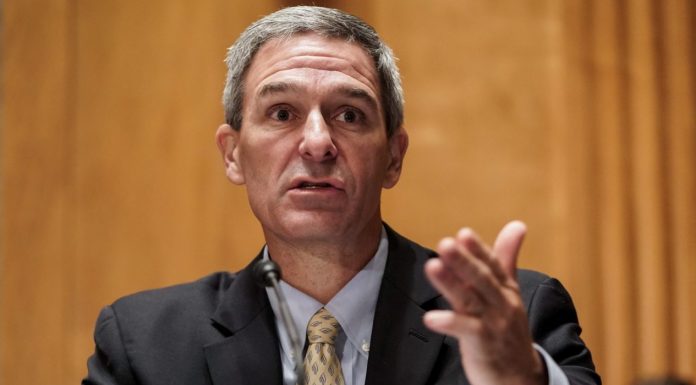(Headline USA) The Trump administration announced plans Tuesday to sharply limit visas for skilled workers from overseas, a move officials said was a priority amid job losses caused by the coronavirus pandemic.
Department of Homeland Security and Department of Labor officials said new rules for what’s known as the H1-B program will restrict who can obtain a work visa and will impose additional salary requirements on companies seeking to hire foreign workers.
Acting Deputy DHS Secretary Ken Cuccinelli said about one-third of the people who have applied for H1-B visas in recent years would be denied under the new rules, which also will include limits on the number of specialty occupations available under the program.
President Donald Trump in June issued an order temporarily suspending the H-1B program until the end of the year.
Trump has long made it a crucial part of his agenda to curb illegal immigration, but in the past he has turned a blind eye—if not openly embraced—pathways to leverage foreign workers legally.
During the boom-days of his robust, pre-COVID economy, Trump’s administration approved what some have cited as unprecedented numbers of skilled foreign-worker visas, amid complaints from immigration-law advocates that American workers in sectors like technology were being outsourced and forced to train their foreign replacements.
But the new faltering economy wrought by widespread economic lockdown measures has turned the GOP leader back toward his “America First” platform with a focus on helping the country to recover before turning an eye elsewhere.
A new requirement that employers pay higher prevailing wages to foreign workers will take effect in the coming days, reflecting the need to help the job market recover from the coronavirus shutdown, said Deputy Secretary of Labor Patrick Pizzella.
“With millions of Americans looking for work, as the economy continues its recovery, immediate action is needed to guard against the risk lower-cost foreign labor can pose to the well-being of U.S. workers,” Pizzella said.
The H-1B program was created under President George H.W. Bush to help companies fill specialized jobs as the tech sector began to boom and it was harder to find qualified workers. Many companies insist they still need the program to fill critical positions.
Critics include labor advocates as well as people who seek limits on legal immigration. But supporters argue that H-1B holders fill critical needs and don’t necessarily take jobs from Americans, but rather help expand the economy and create more opportunity.
Increasing the required wages will especially hurt startups and smaller enterprises that may be unable to meet the increased requirements, said Cornell University Law School professor Steve Yale–Loehr, an expert in immigration law.
“Companies may decide to offshore jobs overseas, hurting U.S. workers,” said Yale–Loehr.
However, there is no evidence that under the current conditions companies would want to risk the negative optics of focusing on their bottom dollar rather than complying with the demand for wage parity.
Cuccinelli and Pizzella said the program has been abused to allow companies to displace American workers with less expensive employees from overseas.
“U.S. workers are being ousted from good paying, middle-class jobs and replaced with non-U.S. workers,” Pizzella said. “It has also caused U.S. wages in some instances to stagnate. That is wrong.”
Among the new rules are significant limits on “offsite” firms that bring in large numbers of H-1B visa holders and then provide those workers under contract to other companies for a fee, a loophole that has been the subject of fraud and other abuse.
There would also be increased workplace inspections and additional oversight of the H-1B program, Cuccinelli said.
The U.S. can issue up to 85,000 H-1B visas per year in technology, life sciences, health care and other sectors. They are typically issued for an initial period of three years and can be renewed.
People from India and China make up the majority of the estimated 500,000 H-1B visa holders in the U.S.
Officials said the Department of Labor rules would take effect immediately after publication in the federal register later this week while those that fall under the Department of Homeland Security would be adopted after a public comment period.
Adapted from reporting by the Associated Press

